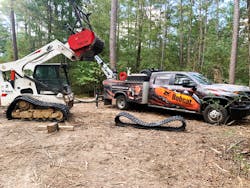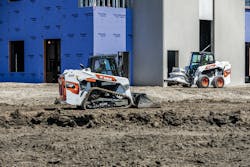How Bobcat North Texas manages customer maintenance
Equipment dealerships armed with the ability to monitor and act on machine data put themselves in the position to best partner with fleets on maintenance management. That is the promising benefit of the little black boxes mounted on more and more equipment. As telematics hardware becomes standard, fleet managers are deciding if and how they will use the machine data, and if and how their dealers can facilitate the conversion of data into insights.
Equipment users—operators and fleet managers—who choose to activate telematics services wrestle with how to filter out the constant stream of alerts activated by various machine codes. Bobcat of North Texas, headquartered in Lewisville, has implemented a monitoring system for its customers to do exactly that. In naming the Bobcat distributor Construction Equipment’s 2022 Dealer Excellence Award winner, we acknowledged its work over the past few years and specific successes in 2021-22.
“We saw the critical code alerts as another opportunity for us to add value to our customers by proactively reaching out to them…rather than relying on their operators or administrative people to monitor these codes on their own,” says Jim Batten, service operations manager, Bobcat of North Texas.
The tool that anchors the dealership’s efforts is Bobcat’s Machine IQ system. Machine IQ telematically transmits machine data to Bobcat, its dealers (via Dealer Machine IQ), and customers who choose to receive it (via Customer Machine IQ).
“If there’s a critical fault code on a customer’s machine, the dealer is alerted,” says Wendi Majerus, digital business product manager, Bobcat. “If the customer has signed up for Customer Machine IQ, they also get alerted. We have some customers that want to be informed directly on their machine’s health, while others rely on their dealer as part of their servicing relationship.”
Majerus says putting the data in the hands of its dealers is key because they have the relationships with Bobcat customers. North Texas participated in Bobcat’s pilot program for Machine IQ in 2017, and she credits the dealership for using Machine IQ to enhance its customer relationships.
“They are acting on that information as soon as they receive it,” Majerus says. “They’re calling their customer. They’re continuing to enhance that relationship as a trusted partner: ‘Hey, they are paying attention to my machine. They do care.’ We want to give that ability to the dealers.”
A companion tool to Machine IQ is My Machine, what Majerus calls a troubleshooting system. If a dealer receives an unfamiliar or more advanced alert, My Machine provides five possible solutions. Depending on what solution is selected, the tool shows steps to correct the problem.
Batten says North Texas saw the critical code alerts as “another opportunity to add value to our customers by proactively reaching out to them to prevent breakdowns or collateral damage.”
Dealer's point person for machine data
Jody Calabrese is Machine IQ manager for Bobcat North Texas. She serves as the in-house service representative to manage machine data for the approximately 4,500 Bobcat machines using the system.
Calabrese began her career at North Texas answering phones. She moved into the service department as an administrative assistant where she would check in customers, write work orders, and talk to customers. When North Texas piloted Machine IQ in 2017, Calabrese moved into her current position.
“Many of our customers recognize Jody right away from our Lewisville service department where she had started in 2016,” says Batten. “That experience gave her the perfect background to move into telematics.”
The service knowledge she gained at Lewisville complements her communication skills and ability to connect with customers. The combination puts her in the perfect position to monitor and communicate machine data insights to customers.
The majority of North Texas customers operate with Machine IQ’s Basic subscription, which is free with each machine and provides location, hours, and fuel usage data. It also tracks maintenance service data. Machine IQ also has a paid subscription, called Health & Security, that provides critical code alerts and email reminders when service is due.
Calabrese’s first task with any new Bobcat machine is to contact the customer and set up the Machine IQ account. She introduces herself as the North Texas contact and explains how she can communicate with them on machine alerts. The customer can choose between telephone notifications, emails, or text message.
Calabrese also manages “service opportunities,” Batten says, when maintenance or other work is due. Machine IQ provides email alerts at service intervals to the dealer. For those with the free Basic subscription, Calabrese notifies the customer and either arranges the service or directs them to the service department for scheduling. For those with the Health & Security subscription, Calabrese receives the same email notification for service that the system sends the customer.
“A lot of our customers do their own service,” Calabrese says. “I can look in our system and see if they’ve bought parts or if they’ve had it serviced in our service department. If they haven’t, I can let them know it’s time for that 500-hour service.”
Machine alerts, however, take up most of Calabrese’s time. They also provide the opportunities to build the partnerships the dealer counts so important with its customers. Calabrese, in effect, becomes the maintenance manager for many North Texas customers.
She receives all critical code alerts for Bobcat machines in the North Texas territory. Her first priority is triage, determining whether the alert warrants a follow up to contact the person responsible for that machine. She does not respond to a “low battery” alert, for example. If a “check engine oil level” alert comes in, she contacts the customer according to the predetermined method.
“A lot of these codes are really important,” Calabrese says. “I know the machines beep at the operator, but sometimes those operators ignore that beeping sound and keep working that machine. So it’s good to let our customers know that, ‘Hey, your machine is coding. You might want to fix it.’”
Calabrese’s service background equips her to continue the conversation to troubleshooting, providing a possible resolution, and scheduling necessary service calls.
How dealer manages maintenance
The dealership has installed Calabrese as the point person for all things Machine IQ. If a customer has questions when she calls, texts, or emails about an alert, they turn to her. Calabrese is able to access the machine’s information through the Bobcat dealer portal, and she can see everything related to that machine.
Her responses vary depending on the nature of the question. If she knows how to handle the service issue, she simply tells the customer what to do to solve it. If the code is more complex, she may ask a dealer service tech or service manager for help determining the root cause. She also has access to the My Machine app. My Machine allows Calabrese to enter the serial number of the machine and the code, Batten says.
“It will break down possibilities of what [the code] could be,” he says. “If you get really technical, it gives a troubleshooting guide. She can advise [the customer]: ‘It could possibly be this, this, this, or this.’”
If the solution can be handled by the customer, her work is done. If it requires a service call, Calabrese refers the customer to North Texas’s service dispatch, where the service can be scheduled.
Machine IQ provides much more opportunity for the dealership to partner with its customers in addition to handling code alerts, however, especially for the customers that subscribe to the Basic service and depend on the dealership to monitor alerts.
“We have always felt our competitive advantage was our long-term approach to dealer support,” says Batten. “All machinery breaks down at some point, and it is at these times that we differentiate ourselves from the competition.
“We are not a 3C dealer: See the machine, see the key, see you later. We understand the role that machine plays in their livelihood.”
The dealer also uses Machine IQ to proactively schedule preventive maintenance for its customers or to do field modifications, similar to the recall notifications on trucks and automobiles. When Calabrese accesses the machine date through the dealer’s portal, PMs and field mods—as Bobcat calls them—are highlighted. She uses that information to communicate the service needs to the customers and arrange to have them fulfilled.
The additional service benefits North Texas, of course, as it provides service revenue. But the benefit to the customer is just as valuable, Batten says, by not only reducing downtime but also minimizing their operating expenses.
Achieving that win-win goal also falls to Calabrese. She has the personal relationships, and she has access to the machine data. In addition to accessing the data when a code comes in, Calabrese also reviews customer machines on a monthly basis. Both efforts allow her to review for PM needs or identify field mods.
As the value of Machine IQ and Calabrese’s customer service focus played out for the dealership, it revealed a weakness in its ability to provide field service, Batten says.
North Texas has nine locations that serve 500 square miles and 6,000 Bobcat units. Each branch has its own service department and corresponding service revenue. Field service calls were handled out of each branch, regardless of the location of the machine, resulting in average service times of two or three days in 2020.
“We were not being efficient,” he says. “We could have had one guy take care of two customers in the same area. Why are we spending the extra fuel to come all the way down to this area? We [gave the call] to another store because we’re worried about our revenue instead of worrying about the cost for the company.
Field service times cut by 30%
“In February 2021, we began the steps to move all our field service trucks out from under their stores and separate service manager,” says Batten. “Instead, we have them report to a centralized field service manager.”
Customers have one phone number to call, and the field service truck closest to the service need responds. Each truck has a home branch that is responsible for the field technician’s salary, fuel, and parts, so the branch receives the revenue generated by the call.
“All of our shops are backlogged,” he says. “Service trucks cost less than real estate does. We’ve tried to get as many trucks on the road as we can.”
The move to centralized dispatch cut average service times by two-thirds, to less than 24 hours. Customer response has been positive, Batten says, even with the fee associated with a field service calls. Communication has been key to acceptance, he says.
“What we really sell is that this isn’t a service charge, it’s a convenience fee,” he says. “‘You don’t have to come in and wait five days at the shop. We can be to you in 24 hours for a convenience fee.’ When you start talking dollars, telling me I can be up and running in 24 hours, good business sense means I just pay the convenience fee.”
Calabrese is also tied into central dispatch. Regardless of where a machine is located when an alert comes across her desk, she is able to connect the customer with central dispatch, ensuring the closest field service truck responds. The combination of Machine IQ and central dispatch provides additional efficiencies, as well.
The majority of codes that a customer calls to report are “generic” without identifying the root cause, much like a “check engine light” on a car. Machine IQ provides the details behind the code, which allows the field techs to be prepared with the appropriate parts when they make the service call.
Central dispatch also allows for the scheduling of multiple customer calls to a single truck, using Machine IQ for location data.
“There are times when a customer doesn’t need [service] today,” Batten says. “[We] can make a note of that, and when [dispatch sees] a truck is going to that area…they can call and say, ‘We’re going to be in your area tomorrow.’”
The combination of Machine IQ and centralized dispatch has also allowed North Texas to reduce its backlog of field mods by 70 percent. As Calabrese reviews machine data in response to an alert, she can identify corresponding field mods, allowing the field service techs to solve both needs on one call.
“In January of 2021, we had just over 1,200 pending field mods, and that was before the release of the other field mods we saw that year,” says Batten. “By the close of 2021, we had reduced our pending field mods down to close to 400.”
The success rate in field mods and service response time has validated the strategy North Texas took to implement its system of monitoring its customers’ machines.
“We want to demonstrate empathy, consult with them in the fastest and best solution to any issues they’re having, and then execute that solution to exceed customer expectations,” says Batten. “Reducing downtime and helping our customers minimize expense only makes us more valuable to them as partners.”










